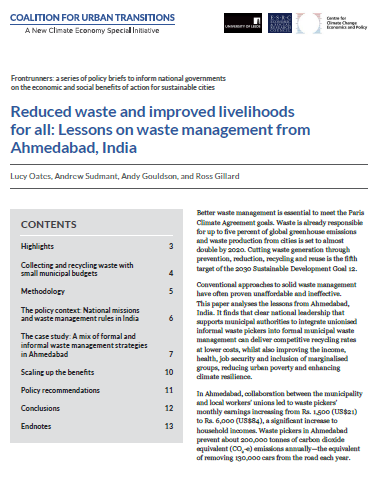Reduced waste and improved livelihoods for all: Lessons on waste management from Ahmedabad, India


This paper analyses lessons from Ahmedabad, India, where collaboration between the municipality and local workers’ unions led to the integration of informal waste pickers into formal municipal waste management systems.
Frontrunners: Policy briefs to inform national governments on the economic and social benefits of action for sustainable cities.
This paper analyses lessons from Ahmedabad, India, where collaboration between the municipality and local workers’ unions led to the integration of informal waste pickers into formal municipal waste management systems. This can deliver competitive recycling rates at lower costs, whilst also improving the income, health, job security and inclusion of marginalised groups, reducing urban poverty and enhancing climate resilience. Waste pickers in Ahmedabad prevent about 200,000 tonnes of carbon dioxide equivalent (CO2-e) emissions annually—the equivalent of removing 130,000 cars from the road each year. Replicated nationwide, this could prevent 6.8Mt of CO2-e each year.
This policy brief is one of a series: ‘Frontrunners’, on innovative climate actions in cities around the world. The objective of this series is to strengthen the evidence on the economic and social implications of low-carbon, climate-resilient urban development. The series focuses on providing robust data on actual or ex post outcomes of climate action, ranging from better public health to job creation to greater equity. Each case study explores some of the preconditions for the successful design and delivery of urban climate action and provides national policy recommendations that could enhance their effectiveness and benefits.